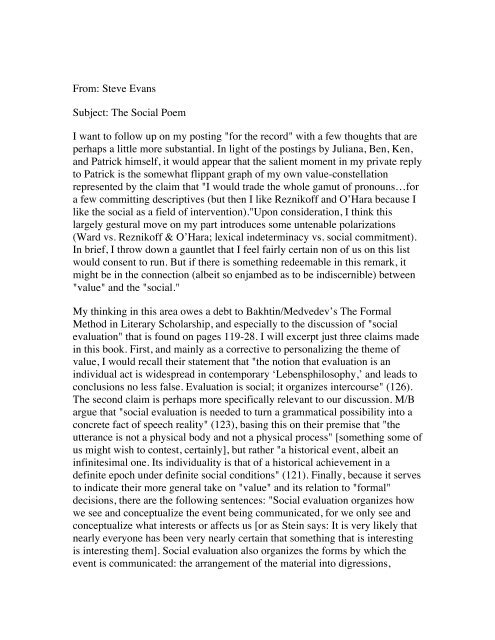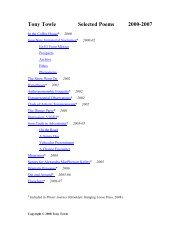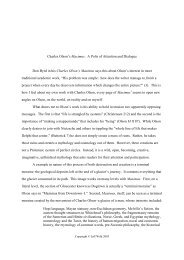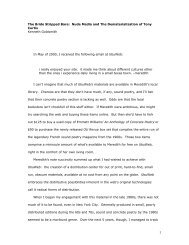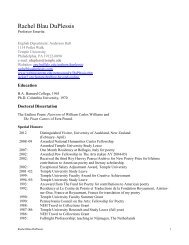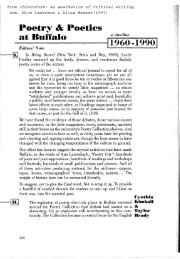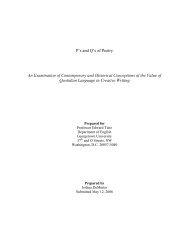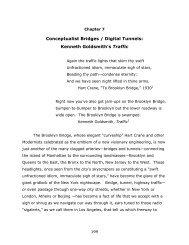Preface - Electronic Poetry Center
Preface - Electronic Poetry Center
Preface - Electronic Poetry Center
You also want an ePaper? Increase the reach of your titles
YUMPU automatically turns print PDFs into web optimized ePapers that Google loves.
From: Steve Evans<br />
Subject: The Social Poem<br />
I want to follow up on my posting "for the record" with a few thoughts that are<br />
perhaps a little more substantial. In light of the postings by Juliana, Ben, Ken,<br />
and Patrick himself, it would appear that the salient moment in my private reply<br />
to Patrick is the somewhat flippant graph of my own value-constellation<br />
represented by the claim that "I would trade the whole gamut of pronouns…for<br />
a few committing descriptives (but then I like Reznikoff and O’Hara because I<br />
like the social as a field of intervention)."Upon consideration, I think this<br />
largely gestural move on my part introduces some untenable polarizations<br />
(Ward vs. Reznikoff & O’Hara; lexical indeterminacy vs. social commitment).<br />
In brief, I throw down a gauntlet that I feel fairly certain non of us on this list<br />
would consent to run. But if there is something redeemable in this remark, it<br />
might be in the connection (albeit so enjambed as to be indiscernible) between<br />
"value" and the "social."<br />
My thinking in this area owes a debt to Bakhtin/Medvedev’s The Formal<br />
Method in Literary Scholarship, and especially to the discussion of "social<br />
evaluation" that is found on pages 119-28. I will excerpt just three claims made<br />
in this book. First, and mainly as a corrective to personalizing the theme of<br />
value, I would recall their statement that "the notion that evaluation is an<br />
individual act is widespread in contemporary ‘Lebensphilosophy,’ and leads to<br />
conclusions no less false. Evaluation is social; it organizes intercourse" (126).<br />
The second claim is perhaps more specifically relevant to our discussion. M/B<br />
argue that "social evaluation is needed to turn a grammatical possibility into a<br />
concrete fact of speech reality" (123), basing this on their premise that "the<br />
utterance is not a physical body and not a physical process" [something some of<br />
us might wish to contest, certainly], but rather "a historical event, albeit an<br />
infinitesimal one. Its individuality is that of a historical achievement in a<br />
definite epoch under definite social conditions" (121). Finally, because it serves<br />
to indicate their more general take on "value" and its relation to "formal"<br />
decisions, there are the following sentences: "Social evaluation organizes how<br />
we see and conceptualize the event being communicated, for we only see and<br />
conceptualize what interests or affects us [or as Stein says: It is very likely that<br />
nearly everyone has been very nearly certain that something that is interesting<br />
is interesting them]. Social evaluation also organizes the forms by which the<br />
event is communicated: the arrangement of the material into digressions,


